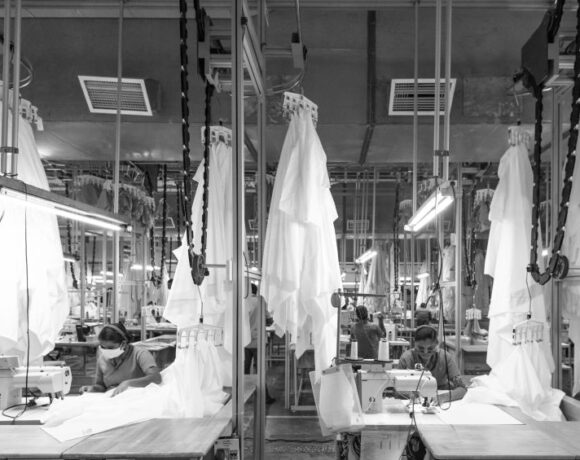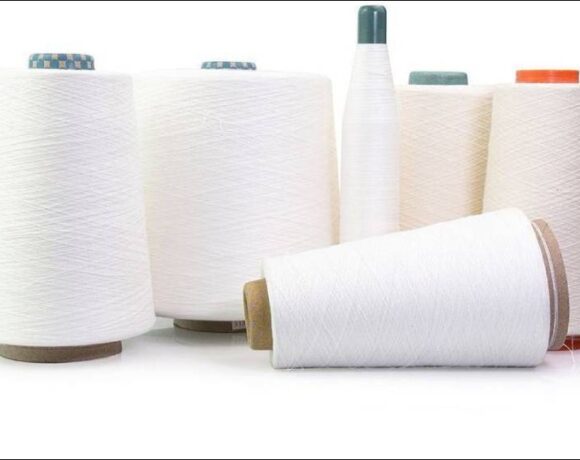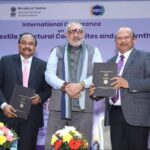T&A Sector – Towards Sustainable Growth

The textiles & apparel sector is aiming towards attaining circularity. Our correspondent takes stock of the initiatives being taken by the industry
The Textile and Apparel (T&A) sector is consciously trying to adopt circularity as the industry is aggressively looking to achieve its sustainability goals by bringing in multiple green practices across its value chain. Experts are of the view that since the customers also now prefer joining hands with suppliers who are more serious in sustainable and green practices, the only way out for the industry players is to join this movement in a more dedicated manner.
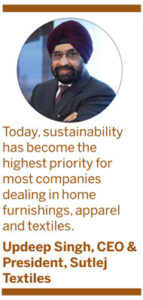 “Today, there is a big surge in awareness about how you manufacture your products in a more sustainable manner without hurting your climate and surroundings. Circularity in T&A making is catching up fast as the industry is gearing up to infuse sustainability elements in a more structured manner. In fact, this is the only way out if the industry wants to sustain in the longer term,” says Rahul Mehta, past President, Clothing Manufacturers of India and Director of Mumbai-based Creative Group of Companies.
“Today, there is a big surge in awareness about how you manufacture your products in a more sustainable manner without hurting your climate and surroundings. Circularity in T&A making is catching up fast as the industry is gearing up to infuse sustainability elements in a more structured manner. In fact, this is the only way out if the industry wants to sustain in the longer term,” says Rahul Mehta, past President, Clothing Manufacturers of India and Director of Mumbai-based Creative Group of Companies.
“Textile businesses have taken up important issues like climate change and the development of sustainable textiles more seriously than ever. Even consumers are demanding textiles that have been produced in an ethical manner. This, in turn, has increased the demand for sustainable and eco-friendly textiles. Today, sustainability has become the highest priority for most companies dealing in home furnishings, apparel and textiles. We at Sutlej Textiles and Industries Ltd have taken several steps and have aims to optimize environment-friendly operations and reduce our company’s carbon footprint by investing in green technologies and sustainable practices,” says Updeep Singh, CEO & President of Sutlej Textiles.
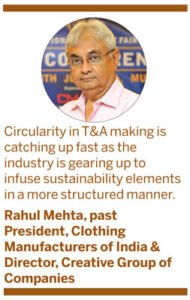 The Rs 3000-crore company, one of the largest manufacturers of spun-dyed yarn and value-added mélange yarn in the country today, has recently got the distinction of becoming one of the few large Indian textile companies to have integrated backward manufacturing ‘green’ fibre facility. With an aim to transform the company into a sustainable entity, the company has initiated the production of Polyester Staple Fibre (PSF) by recycling PET bottles at an investment of Rs 225 crore. The 120-tonne per day capacity of recycled PSF, located in Baddi, Himachal Pradesh, has already been commercialised from March 2021. The company consumes over 85 per cent of its green-fibre capacity for its captive requirement.
The Rs 3000-crore company, one of the largest manufacturers of spun-dyed yarn and value-added mélange yarn in the country today, has recently got the distinction of becoming one of the few large Indian textile companies to have integrated backward manufacturing ‘green’ fibre facility. With an aim to transform the company into a sustainable entity, the company has initiated the production of Polyester Staple Fibre (PSF) by recycling PET bottles at an investment of Rs 225 crore. The 120-tonne per day capacity of recycled PSF, located in Baddi, Himachal Pradesh, has already been commercialised from March 2021. The company consumes over 85 per cent of its green-fibre capacity for its captive requirement.
Sutlej, which is also into home textiles (though a much smaller business presently), manufactures polyester fibre utilizing PET waste. Besides, the initiative addresses a growing consumer need to buy garments utilizing recycled fibre. As prominent garment labels the world over replace synthetic fibres with ‘greener’ alternatives, a wider market has emerged for green fibre. Sutlej’s manufacture of green fibre resulted in capacity utilization ofalmost 97 per cent.Most of the fibre produced is consumed within the company, thereby strengthening value-addition and resilience to a challenging price environment. More importantly, the backward integration enhanced the company’s image as a responsible and reliable manufacturer.
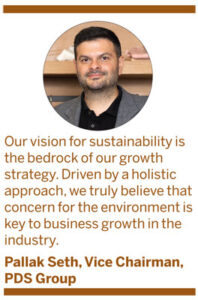 “Our vision for sustainability is the bedrock of our growth strategy. Driven by a holistic approach, we truly believe that concern for the environment is key to business growth in the industry. Be it working with like-minded partners, manufacturing products within our own facilities, complying with environment-friendly practices set forth by our internal strategic teams, or even the selection of potential ventures, everything is done to realise our vision of attaining social and ecological equilibrium,” says Pallak Seth, Vice Chairman of PDS Group, which is a global apparel manufacturer and supplier, catering to leading global apparel brands and retailers like Ralph Lauren, Hanes Brands, kohl’s, Calvin Klein, Mango, Walmart, Tesco, Target, Carrefour and many others.
“Our vision for sustainability is the bedrock of our growth strategy. Driven by a holistic approach, we truly believe that concern for the environment is key to business growth in the industry. Be it working with like-minded partners, manufacturing products within our own facilities, complying with environment-friendly practices set forth by our internal strategic teams, or even the selection of potential ventures, everything is done to realise our vision of attaining social and ecological equilibrium,” says Pallak Seth, Vice Chairman of PDS Group, which is a global apparel manufacturer and supplier, catering to leading global apparel brands and retailers like Ralph Lauren, Hanes Brands, kohl’s, Calvin Klein, Mango, Walmart, Tesco, Target, Carrefour and many others.
“The growing importance of sustainability reporting is supported by the fact that investors and other stakeholders are calling on companies to disclose more about their sustainability and Environmental, Social and Governance (ESG) strategies. ESG reporting is an ideal and effective means of enabling companies to answer in a single document a wide variety of questions that stakeholders may raise. I am very pleased and proud of the effort and momentum that the PDS Group and its constituent business units have put into our sustainability agenda,” adds Seth who has set a unique, asset-light, plug-and-play platform that not only performs the functions in an asset-light manner and hence infuse scalability and robustness into the business, but also promotes a large entrepreneurial ecosystem alongside its entire value chain.
The $ 1.2-billion PDS Group offers a compelling proposition for best talents from across the world through its global consumer-driven manufacturing and sourcing platform. In fact, PDS today offers a trend-setting platform for entrepreneurs who want to set up and run their businesses on its platform.
“A circular economy can be a game changer for Indian suppliers and manufacturers of textiles and apparels. Indian suppliers and manufacturers stand to make considerable gains if they proactively adopt good practices and innovate through circular business models and practices and get ready to be part of the transformation that is happening globally. However, global discussions on circular economy have to be clearly contextualised for India. India is both a major producer and consumer of textiles and apparels and any circular economy intervention has to be aligned to the requirements of the value chain actors in India,” says a report by the Centre for Responsible Business (CRB), a think-tank based out of New Delhi. CRB has created the framework to capture circular economy priorities or action points in alignment with the principles of a circular economy. This paper has been developed through extensive engagement with the stakeholders of the Indian T&A industry and identifies CE priorities in the Indian context.
In fact, the textile industry is the second-most polluter globally. More than 20 per cent of industrial water pollution is due to garment manufacturing. Globally, 80 per cent of textile waste generated is not recycled and is often sent to landfills or incinerated. In fact, the industry is responsible for over 8 per cent of global pollution. With a growing economy and changing demographics, the consumption of textiles and clothing has gone up by more than 60 per cent today as compared to theconsumption in 2000.In the past 15 years, textile production has almost doubled.This has significantly aggravated the whole situation.
The industry finds itself in a quandary as it is struggling to balance its mainstream targets of productivity and production and its sustainability goals. The current linear system of production, distribution and usage of T&A is not sustainable as there is less regard for environmental impact. Experts are of the view that the current ‘take-make-dispose’ approach not only adversely impacts the environment and society, but also the future business of the T&A industry.
“With the world’s biggest fashion brands increasingly committing to net zero targets, we are witnessing an upward momentum for sustainability in the international fashion arena. This era of environmental and social awareness as well as governance in the textile industry has to be the major focus for India. The concerted policy action such as the European Union’s Circular Economy Action Plan, which paves the way for the transition to a circular economy, the recently introduced New York Fashion Bill for supply chain mapping, and other such positive international developments will significantly affect the Indian textile sector given its crucial role in the global textile and apparel value chains,” says Atul Bagai, Head, United Nations Environment Programme (UNEP), Country Office, India.
UNEP’s work focuses on the value chain approach for interventions in the textile sector. It believes that coordinated actions in all regions by all stakeholders (government, industry, and consumers) and changes at each stage in the value chain involving players of all sizes and market segments are required to transition to a more sustainable and circular fashion. Additionally, stronger governance and policies are critical. UNEP is developing a roadmap for a collaborative pathway towards greater sustainability and circularity in the textile value chain.
“The concept of ‘reuse, recycle and reduce’ can take us towards the sustainable future in the years to come. We have become more materialistic without many constraints and this is damaging our very own environment. Regarding recycling of products, we are moving in the right direction, but this alone is not sufficient. The other two are also very important elements which need to be imbibed in our daily lifestyle. Innovative technologies and enhanced cooperation between the industry, academia and government will be the key enablers towards sustainability in the sector,” says Prof R.S. Rengasamy, Department of Textiles and Fibre Engineering, Indian Institute of Technology, Delhi.
Bain & Company conducted research in partnership with the World Economic Forum which shows that business leaders increasingly feel a sense of urgency about embracing circularity. Circular disruption is underway in many industries, often led by new entrants with innovative business models. In a recent survey of senior executives, it found that leadership teams aregrowing more aware that they are vulnerable to circular disruption the more time they spend preparing for it. In its study, it states that supply chain executives are planning to double the share of revenue from circular products and services by 2030.
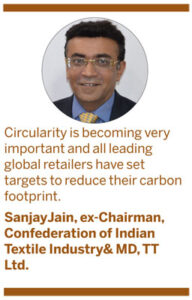 “Circularity is becoming very important, and all leading global retailers have set targets to reduce their carbon footprint – garments and textiles exporters have realised that it is no longer just talk; it’s reality and needs immediate action. However, the speed of action will depend on the buyer’s push and requirements,” says Sanjay Jain, former Chairman, Confederation of Indian Textile Industry (CITI) and MD, TT Ltd.
“Circularity is becoming very important, and all leading global retailers have set targets to reduce their carbon footprint – garments and textiles exporters have realised that it is no longer just talk; it’s reality and needs immediate action. However, the speed of action will depend on the buyer’s push and requirements,” says Sanjay Jain, former Chairman, Confederation of Indian Textile Industry (CITI) and MD, TT Ltd.
Meanwhile, the Indian textile sector is also gearing up to adopt circularity in its value chain. One such effort is the formation of an industry-led platform – Circular Apparel Innovation Factory (CAIF). Started in 2018 and formally launched in November 2019 at Sankalp Forum’s 11th Global Forum in Mumbai, CAIF is a global initiative of Intellecap, the impact advisory arm of the leading impact investing organisation, Mumbai-headquartered Aavishkaar Group, which works to build businesses that can benefit the underserved segments across Asia and Africa. Intellecap builds enabling ecosystems and channelizes capital into creating and nurturing a sustainable and equitable society.
CAIF is supported by the DOEN Foundation, a Dutch foundation supporting initiatives in the field of culture and cohesion and in the field of green and inclusive economy, as also Aditya Birla Fashion & Retail Ltd (ABFRL) as its founding anchor partners. To accelerate the shift of the industry from its current ‘take-make-dispose’ approach to one that is more circular across the lifecycle, CAIF works with a diverse group of stakeholders from across the value chain.
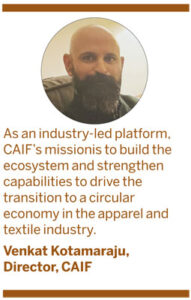 “As an industry-led platform, CAIF’s mission is to build the ecosystem and strengthen capabilities to drive the transition to a circular economy in the apparel and textile industry. The platform is building the textile industry’s innovation infrastructure by bringing together key stakeholders to collaborate and work together on achieving the five key circular goals: increasing the use of sustainable inputs and material; maximising the utilisation of clothing & textiles; increasing the recycling of clothing; boosting production through renewable inputs and minimising negative social impacts and increasing social responsibility,” says Venkat Kotamaraju, Director, CAIF.
“As an industry-led platform, CAIF’s mission is to build the ecosystem and strengthen capabilities to drive the transition to a circular economy in the apparel and textile industry. The platform is building the textile industry’s innovation infrastructure by bringing together key stakeholders to collaborate and work together on achieving the five key circular goals: increasing the use of sustainable inputs and material; maximising the utilisation of clothing & textiles; increasing the recycling of clothing; boosting production through renewable inputs and minimising negative social impacts and increasing social responsibility,” says Venkat Kotamaraju, Director, CAIF.
CAIF has been partnering and collaborating with over 15 brands and manufacturers (local, regional and global) directly through programmes in India and Bangladesh. Through different initiatives, CAIF’s network includes over 400 innovators and solution providers (local, regional and global), which it partners with and enables through capability building and facilitating partnerships with brands and manufacturers across programmes. CAIF’s construct for engaging innovators and solutions providers is through the time-tested 4S ecosystem approach of Search, Seed, Support and Scale.
In the next 24-36 months, CAIF will be looking to partner with 30-40 like-minded and value-aligned organisations, through which it will further build the ecosystem and capabilities across value chain stakeholders.
CAIF is looking to make the work of the apparel, textile and fashion industry more sustainable (resource-efficient, resilient and responsible) through reducing carbon emissions (both avoidance and removal), while creating green and circular jobs for those employed across the value chain. Some of the partner brands and manufacturers have very clear and ambitious targets like, for example, moving to recycled water usage (away from fresh water) by 70-100 per cent between 2025 and 2030, eliminating energy usage and consumption by 30-50 per cent by 2030, replacing virgin material usage with recycled material use by 50-70 per cent by 2030, etc.


